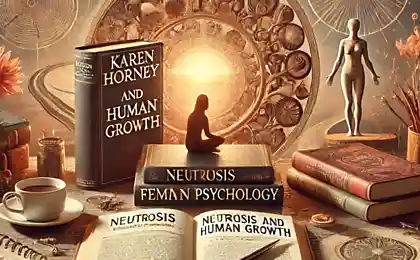748
The need for approval, and 9 more neurotic human needs
Met Have you ever a man who had seemed to be a pathological need to please others? According to Karen Horney, this behavior is associated with a neurotic need for love and approval. In his book "Self Analysis" (1942), Horney outlined the theory that describes the different types of neurotic behavior, which is the result of excessive use of strategies to address the problems caused by the basic concern, and inadequate to meet the needs. These include the need for power, prestige, and love.

The theory of Karen Horney
The psychoanalyst Karen Horney developed one of the most well-known theories of neurosis. She believed that neurosis is the result of anxiety caused by the problems in interpersonal relationships. Her theory suggests that a strategy commonly used to cope with anxiety, can be used so often that eventually begin to supplant needs.
According to Horney, children basic anxiety (and therefore neurosis) may lead to a variety of consequences, including "... direct or indirect domination, indifference, strange behavior, lack of respect for the individual child's needs, the lack of real control, belittle the role relationships, excessive admiration or its absence, there is no heat in the relationship need to take the side of one of the parents in their disagreements, too much responsibility, or lack thereof, over-protection, isolation from other children, injustice, discrimination, unfulfilled promises, hostile atmosphere, and so on. d. "(1945).
Dedicated to her 10 neurotic needs can be divided into three main categories:
Requirements, which brings us to the other. These neurotic needs lead people to seek approval and acceptance of others; such people are often described as pushy or intrusive due to the fact that they are looking for approval and love.
Requirements that alienates us from others. This neurotic needs engender hostility and antisocial behavior. People who are dominated, often referred to as cold, indifferent, detached.
Requirements that set us against others. These neurotic needs not only lead to hostility, but also to the desire to control others. Such people are often called complex, imperious and unkind.
So what makes these coping strategies neurotic? According to Horney, it is the excessive use of one or more of these styles of interpersonal relationships.
Neurotic needs
In his book, "Introspection" Horney identified 10 neurotic needs:
The neurotic need for affection and approval. It includes the desire to be loved, the desire to please others and meet their expectations. People with this type of poterbnosti extremely sensitive to failure and criticism, as well as the fear of anger or hostility from others.
The neurotic need for a governing partner. It includes the need to focus on the partner. People with this type of needs experienced extremely strong fear of being abandoned by their partners. Often, these people give exaggerated importance to love and believe that having a partner will solve all the problems in their lives.
Neurotic need for clear limitations. People with this need prefer to remain invisible. They are unpretentious and are accustomed to be content with little. They do not want material things, often underestimating their own needs and underestimating their own talents and abilities.
The neurotic need for power. Those who have dominated this need, seek power for its own sake. They tend to admire the strength and despise weakness, at any opportunity they would use another person or begin to dominate him. These people are afraid of the limitations of helplessness and uncontrollable situations.
Neurotic need for exploitation of others. These people see other only in terms of what you can get from them. These people are proud of their ability to use other people, and are often focused on the manipulation of others in order to achieve the desired goals, including the power, money and sex.
The neurotic need for social recognition. Those with a need for prestige evaluate themselves and others in terms of public recognition. Material possessions, personal characteristics, professional achievements, and even close relationships are evaluated on the basis of this parameter. Such people are often afraid to get into an awkward situation or lose social status.
The neurotic need for a rapture. People with neurotic need for admiration is - mainly narcissistic egotists who have formed an exaggerated idea of itself. They want to be admired, as a basis for taking this view is, rather than what they actually are from themselves.
Neurotic need for ambition. As Horney believes because of the basic alarm people themselves forced himself to reach more and more. These people are afraid of failure and feel a constant need for the accomplishment of more than with others, and sometimes even in comparison with its own success.
The neurotic need for self-sufficiency and independence. These people have the mentality of "loner". They seek to distance themselves from the others in order to avoid attachment or dependence on others.
The neurotic need for perfection and irrefutable. These people are constantly striving to complete infallibility. A common feature of this neurotic need is to find their own shortcomings to overcome them quickly or hide.

The theory of Karen Horney
The psychoanalyst Karen Horney developed one of the most well-known theories of neurosis. She believed that neurosis is the result of anxiety caused by the problems in interpersonal relationships. Her theory suggests that a strategy commonly used to cope with anxiety, can be used so often that eventually begin to supplant needs.
According to Horney, children basic anxiety (and therefore neurosis) may lead to a variety of consequences, including "... direct or indirect domination, indifference, strange behavior, lack of respect for the individual child's needs, the lack of real control, belittle the role relationships, excessive admiration or its absence, there is no heat in the relationship need to take the side of one of the parents in their disagreements, too much responsibility, or lack thereof, over-protection, isolation from other children, injustice, discrimination, unfulfilled promises, hostile atmosphere, and so on. d. "(1945).
Dedicated to her 10 neurotic needs can be divided into three main categories:
Requirements, which brings us to the other. These neurotic needs lead people to seek approval and acceptance of others; such people are often described as pushy or intrusive due to the fact that they are looking for approval and love.
Requirements that alienates us from others. This neurotic needs engender hostility and antisocial behavior. People who are dominated, often referred to as cold, indifferent, detached.
Requirements that set us against others. These neurotic needs not only lead to hostility, but also to the desire to control others. Such people are often called complex, imperious and unkind.
So what makes these coping strategies neurotic? According to Horney, it is the excessive use of one or more of these styles of interpersonal relationships.
Neurotic needs
In his book, "Introspection" Horney identified 10 neurotic needs:
The neurotic need for affection and approval. It includes the desire to be loved, the desire to please others and meet their expectations. People with this type of poterbnosti extremely sensitive to failure and criticism, as well as the fear of anger or hostility from others.
The neurotic need for a governing partner. It includes the need to focus on the partner. People with this type of needs experienced extremely strong fear of being abandoned by their partners. Often, these people give exaggerated importance to love and believe that having a partner will solve all the problems in their lives.
Neurotic need for clear limitations. People with this need prefer to remain invisible. They are unpretentious and are accustomed to be content with little. They do not want material things, often underestimating their own needs and underestimating their own talents and abilities.
The neurotic need for power. Those who have dominated this need, seek power for its own sake. They tend to admire the strength and despise weakness, at any opportunity they would use another person or begin to dominate him. These people are afraid of the limitations of helplessness and uncontrollable situations.
Neurotic need for exploitation of others. These people see other only in terms of what you can get from them. These people are proud of their ability to use other people, and are often focused on the manipulation of others in order to achieve the desired goals, including the power, money and sex.
The neurotic need for social recognition. Those with a need for prestige evaluate themselves and others in terms of public recognition. Material possessions, personal characteristics, professional achievements, and even close relationships are evaluated on the basis of this parameter. Such people are often afraid to get into an awkward situation or lose social status.
The neurotic need for a rapture. People with neurotic need for admiration is - mainly narcissistic egotists who have formed an exaggerated idea of itself. They want to be admired, as a basis for taking this view is, rather than what they actually are from themselves.
Neurotic need for ambition. As Horney believes because of the basic alarm people themselves forced himself to reach more and more. These people are afraid of failure and feel a constant need for the accomplishment of more than with others, and sometimes even in comparison with its own success.
The neurotic need for self-sufficiency and independence. These people have the mentality of "loner". They seek to distance themselves from the others in order to avoid attachment or dependence on others.
The neurotic need for perfection and irrefutable. These people are constantly striving to complete infallibility. A common feature of this neurotic need is to find their own shortcomings to overcome them quickly or hide.























